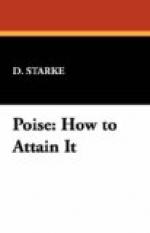The dread of responsibility that might devolve upon him turns him aside from every sort of endeavor, and he passes his life in a hopeless and sluggish inaction, from a fear of drawing down upon himself reproaches to which he might have to make answer or of being compelled to take part in discussions which would involve the disturbing of his indolent repose.
Are we to suppose then that he finds real happiness in such a state of things?
Certainly not, for this negative existence weighs upon him with all the burden of a monotony that he feels powerless to throw off. His own mediocrity enrages him while the success of others fills him with dismay.
Nevertheless his weakness of character allows the hate of action to speak more loudly to him than legitimate ambition, and keeps him in a state of obvious inferiority that of itself gives birth to numberless new enemies, who end by destroying him utterly.
He is first attacked by slowness of comprehension, the inevitable consequence of that idleness that causes the cowardly to shun the battle.
Rather than combat influences from without he allows them daily to assume a more prominent and a more definite place in his thoughts.
His hatred of action says no to all initiative and he considers that he has accomplished his whole duty toward society and toward himself when he says: “What’s the use of undertaking this or that? I haven’t a chance of succeeding and it is therefore idle to invite defeat!”
So quickly does the change work that his mind, from lack of proper exercise, rapidly reaches the condition where it can not voluntarily comprehend any but the most simple affairs and goes to pieces when confronted with occasions that call for reflection or reasoning, which he considers as the hardest kind of work.
It is hardly a matter for astonishment, therefore, that under these conditions effeminacy should take possession of a soul that has become the sport of all the weaknesses that are born of a desire to avoid exertion.
We do not care to draw the picture of that case too often encountered in which this moral defeat becomes changed into envy, the feeling of bitterness against all men, the veritable hell of the man who has not the power to make the effort that shall free him.
Mental instability is the inevitable consequence of this state of affairs.
All brain-activity being regarded as a useless toil, the man of timidity never understands the depth of the questions he has not the courage to discuss. If he does talk of them, it is with a bias rendered all the more prejudiced by the fact that, instead of expressing his ideas, he takes refuge in fortifying his heresies with arguments of which the smallest discussion would demonstrate the worthlessness.
This unwillingness to discuss conditions gives rise among people who are deficient in poise to a special form of reasoning, which causes them to summarize in the most hurried fashion even the gravest events, upon the sole consideration that they are not asked to take part in them. If, by any chance, they are forced to be actors in these events the least little incident assumes for them the most formidable proportions.




